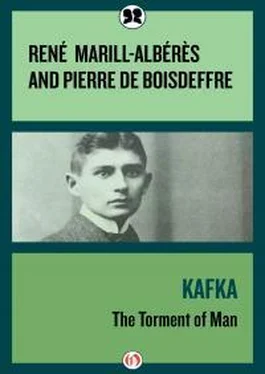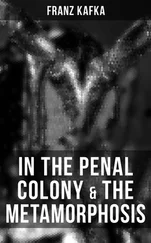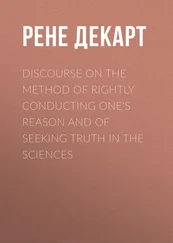Notwithstanding this rather unromantic description, Kafka had to confess that he was deeply moved and soon thought of marriage, though without managing to exorcise the anguish still connected with this word. The interminable correspondence initiated after F. B. returned to her family could only alarm the young lady concerning the intentions of this strange correspondent, more adept at explaining himself than at committing himself. Max Brod quotes the rough draft of a letter (November 9, 1912) which dwells on the fears of his friend.
Dearest Fräulein, you must not write to me any more, and I shall not write to you any more either. I could not fail to make you unhappy if I wrote to you, and I myself am beyond all help. To admit that to myself, I did not have to count every stroke of the clock all night long, for I was fully aware of it before my first letter, and since I tried to cling to you in spite of everything, I would deserve to be cursed if I were not already cursed … Quickly forget the ghost that I am and live in happiness and peace as you did before.
Kafka’s hesitations were to last for almost five years. During this time he, like Kierkegaard and Amiel, would never stop weighing the advantages and disadvantages (the latter always more compelling than the former) of the two solutions between which he could not make a choice. In successive pages of his Diary he oscillates like a pendulum between praise of solitude and homage to marriage. Even though he deplores “the afflux of blood in his head and its sterile reflux,” he is beset by an almost constant ebullition of images and themes. If he could be sure of reconciling literary production and married life, he would elect marriage. Modestly he recapitulates the arguments “for and against my marriage.” His long, conscientious balance sheet, dated July 21, 1913, lists the following points:
Inability to bear living alone, not inability to live, quite the opposite; it is even unlikely that I can live with someone, but I am unable alone to bear the onslaught of my own life, the assault of time and old age, the vague stimulus of the desire to write, my sleeplessness, the near approach of madness. Alone, I am unable to bear all this, I shall add naturally “perhaps.” My union with F. will confer new strength, new powers of resistance on my existence.
A little later, however, he adds “I must be alone a great deal. All that I have accomplished is the result of solitude.” We have already called attention to his next observations.
I hate everything which is not connected with literature. Conversations bore me, paying calls bores me, the joys and sorrows of my relatives bore me insufferably. Conversations remove the importance, the seriousness, and the truth from everything I think.
Fear of being tied down, of overflowing into another personality. Then I would never again be alone … Single, I might perhaps really give up my job one day; married, I can never do this. Everything given to the woman would be taken from literature. This, above all else, must not be!
There is more; carnal union (as an obligation and pattern of conduct) horrifies him. “Copulation is punishment for the happiness of living together.” The sole possibility of tolerating marriage is “to live as ascetically as possible, more ascetically than a bachelor.”
In short, the balance sheet remains negative.
Under these conditions, it is not surprising to find that Kafka looks upon breaches of their relationship with sorrow perhaps, but also with a sense of relief. After the first break, August 13, 1913, he writes:
What I may suffer, what she may suffer is nothing in comparison with the mutual suffering that will ensue. I shall recover slowly, she will marry, that is the only possible outcome when two human beings are involved. We two cannot blast a road through the rocks for ourselves; it is enough for us to have wept and tormented ourselves for a whole year because of that. She will understand that from my last letters.
But he adds immediately: “If she does not, I shall surely marry her for I am too weak to refute what she thinks about our mutual happiness, and completely unable to resist undertaking, insofar as I am able, what she considers to be possible.” 6Still, pleasure—“punishment for the happiness of living together”—must be ruled out. Candidly Kafka raises questions. What will F. B. think? Will she understand?
Thus for days Kafka struggles against contradictions from which there is no escape—in a labyrinth in which he exhausts his mental strength in the attempt to overcome these contradictions—caught between the horror of loneliness and the terror of marriage, between fear of disappointing his fiancée by abandoning her and fear of destroying her by marrying her.
For five years his attempts to reach a decision dominated his life and were the source of “his literary works and his religious qualms.” 7The hopeless situation into which he had slowly forced F. caused him to feel that he had an obligation to marry her—an obligation which was “ineluctable but not without limit.” He drew up a lengthy statement, intended for the father of his beloved, in which the lucidity of his poignant confession is infused with dark humor which could reasonably be expected to lead to the rejection of his request. The following are extracts from this letter, truly of capital importance.
My job is unbearable because it is inconsistent with my sole desire and my sole vocation, which is literature. Since I am nothing except literature, since I cannot and will not be anything else, my job could never inspire me but it could sidetrack me completely. I am almost at that point now. I am constantly being overpowered by nervous disorders of the worst kind, and this year, marked by the worries and torments occasioned by my future and your daughter’s, has definitely proven my lack of resistance….
Contrast me with your daughter, this healthy, gay, unpretentious, robust person. As I have told her in about five hundred letters, although she has pacified me each time with a “No” based on grounds that are in truth hardly convincing, the fact remains that, if I have any foresight in the matter, she is certain to be unhappy with me. This is not simply a consequence of my external situation; it stems rather from a flaw in my true nature, for I am withdrawn, silent, unsociable, unsatisfied. I cannot, however, claim title to a predisposition to unhappiness, for it is only the reflection of my aim. Conclusions can at least be drawn from my way of life. Well! I live with my family, the best, most loving persons—and yet I am stranger than a stranger. To my mother I have not spoken twenty words a day, on the average, for the past several years; with my father I have hardly chanced to exchange anything more than daily greetings. As for my married sisters and brothers-in-law, I do not speak to them at all, yet am not on bad terms with them. The reason is simple: I have not the slightest thing to say to them. Everything that is not literature bores me and I hate it, for it upsets me or handicaps me, even if this sounds presumptuous. At the same time, I lack any sense of family life; at best, I am simply an observer. I have no feeling of kinship and look upon visits as spiteful intrusions on my privacy. Marriage could not change me, no more than my job can change me.
Here is the true reason for his retreat from marriage: loneliness in his vocation. Kafka often records this fact in his Diary . For instance, this sentence, written in 1911, throws much light on his thought: “Apart from human relations, there is in me no visible deceit. The limited circle is pure.”
Still, his hesitations were to last a long time: tacit engagement at the end of 1912, broken in the summer of 1913; official engagement in April, 1914, broken the following July; relations restored in 1915, new engagement the next year, followed by a new, definite break!
Читать дальше












